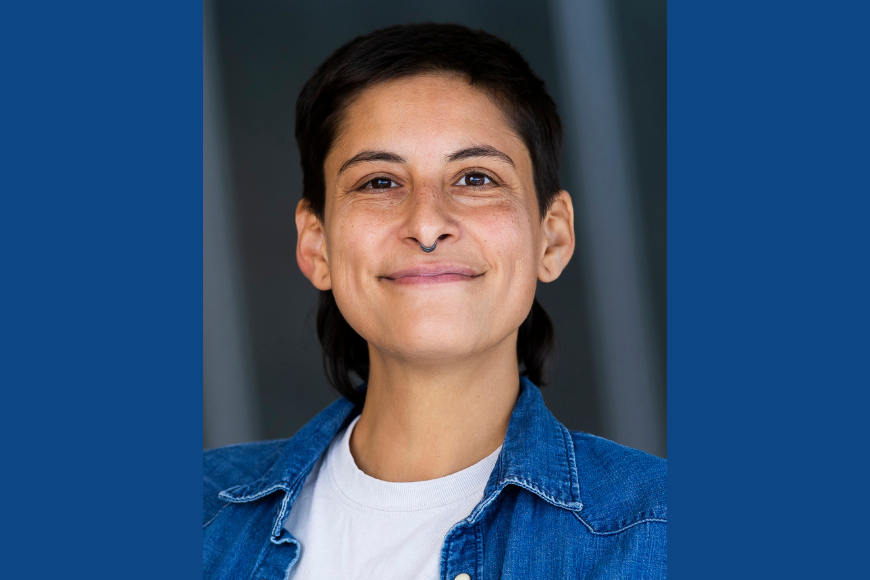Running Towards
E Ornelas’s work is interdisciplinary, although it may be more accurate to describe it as a confrontation of the limitations of disciplinarity itself. This is the promise of the radical imagination reflected in E’s speaking and writing: the ability to develop new techniques of world-building that do not rely on the traditions or ideals of any one academic discipline.
During the 2021-22 academic year, E Ornelas has been the Interdisciplinary Doctoral Fellow (IDF) housed in the Center for Race, Indigeneity, Disability, Gender, and Sexuality Studies (RIDGS), where they have made massive strides towards the completion of their dissertation and contributed to the academic and social life of our community. A doctoral candidate in Feminist Studies, E has more than fulfilled the symbiotic relationship intended by the Interdisciplinary Doctoral Fellowship. E has been supported by RIDGS in numerous ways, most notably a Dissertation Chapter Workshop with Drs. Sami Schalk of The University of Wisconsin-Madison, Chad Infante of The University of Maryland, and Scott Branson of Appalachian State University. In return, E has invigorated RIDGS’ graduate student programming, represented RIDGS sparklingly at the WisCon Convention, and furthered the academic and community work embodied by RIDGS in everything they have accomplished.
Focus on Speculative Fiction
E studies the speculative fiction writings of Black and Indigenous authors, particularly those who identify as women, trans, queer, or two-spirit. They focus on the theme of violence within those works, and how characters respond to acts of violence without the use of retaliatory violence, police punishment, or prisons. E’s dissertation analyzes these examples and extrapolates strategies for abolitionist activists to use in the present moment. This work is not situated within the traditional fields of English, comparative literature, gender studies, American studies, or criminal justice, but it draws on all of them. E’s strategy of mapping literary analysis onto real-world contexts is relatively unexplored ground in any of these fields, and E relies heavily on the lenses and methodologies formulated by women of color feminism to guide them through the process. Central to this project is the serious consideration of speculative fiction as a generative site for radical new conceptions of world-building that could not be theorized using the structures and frameworks of the present day.
E’s graduate-level work at the University of Minnesota began firmly grounded in the social sciences. They conducted human subject research into community-based work dealing with violence in those communities. E was drawn to the array of difficult situations involving violence that require more nuanced and restorative solutions than the summoning of the police, who would likely worsen such situations. It was during the RIDGS (RIGS at the time) Dissertation Proposal Development Program during E’s second year of graduate studies that they realized that they could combine both of the passions that drove their work into one project: abolitionist activism and speculative fiction. The resulting project proposal was original in its creativity, breadth, and ambition. Its unwillingness to fit cleanly into the rubrics of traditional social sciences or humanities projects requires E to continually mount spirited defenses of its feasibility and methodologies. The work contains great promise. It combines the rigorous research of a doctoral dissertation, the intensive literary analysis and cultural criticism of a humanities project, the exhaustive sociological and public policy analyses of a social science project, and the incorporation of lived human experience and radical imagination of an activist project, which altogether create a whole greater than the sum of its parts.
The Joy of the Work
E sees themself as “pushing the boundaries [of each of these fields] in very fun and good ways.” Part of the joy of that work is the fun of engaging with speculative fiction, science fiction, and fantasy texts. However, E is cautious never to accept any of these productions at face value, saying: “People brush these things off as just escapism. These things have real consequences; they come from a real place. They have this Trojan horse; there are other things inside of them or behind them pushing them forward. Critical media literacy is really important, more so than ever.”
E is extremely cognizant that the work they are doing cannot be accomplished in a vacuum. They rely on a vast network of colleagues and mentors in university and activist communities and constantly draw knowledge, inspiration, and alternative perspectives from authors outside of formal academia like Ursula LeGuin, Octavia Butler, and the prolific activist Mariame Kaba. The Marrow Thieves by Cherie Dimalin features prominently in E’s dissertation. Texts like these offer the dual benefit of providing the escapist reading pleasure of speculative fiction and the inspiration and sense of urgency to learn the lessons from the stories so as to avoid the apocalyptic events they predict. An example of the inspiration drawn from these works comes from The Marrow Thieves, whose protagonist adopts the radical stance to stop fleeing their persecutors and instead “run towards.” This is the attitude that E takes to facing issues both within and outside the institution.
Building a Network
At the University of Minnesota, E works closely with Dr. Juliana Hu Pegues, formerly of U of M English, now at Cornell. Dr. Hu Pegues has served as a crucial mentor and source of encouragement and guidance as they navigate uncharted academic waters.
The writing process would not be possible without constant conversations with friends and peers who push E and strengthen their ideas. These interpersonal connections were sorely lacking during the pandemic isolation, which is why E has thrown themselves back into student life and organizing to make up for lost time. With RIDGS support, E and colleagues AK Wright and Qui Alexander formed the Abolitionist Feminist Reading Group, which brought in graduate students to reconnect and study revolutionary new texts in an environment of solidarity and friendship. It is in spaces like this where imagination work flourishes. E believes strongly in the words and spirit of Gloria Anzaldúa, who said, “Nothing happens in the 'real' world unless it first happens in the images in our heads." E believes that all too often, activist movements have used the language of imagination, but never truly taken seriously enough the world-building potential of speculative fiction.
Nothing happens in the 'real' world unless it first happens in the images in our heads.
Gloria Anzaldúa
Direct Action
E has also devoted an enormous amount of time and energy to direct activist action, projecting the images in their head into the real world. They are a part of the Institute for Advanced Studies Minnesota Critical Futures Collaborative with a group of Indigenous and Black scholars, which often takes their work into the community. E presented at and helped organize this year’s WisCon Convention. They also co-founded a housing co-op, Mutual Aid Twin Cities Cooperative, which provides low-cost housing to marginalized people experiencing housing insecurity and has grown significantly in the last three years. This has been a particular point of pride for E, who said, “It’s been really amazing to grow that and also be a form of enacting my own politics and creating alternative visions of collective property ownership outside of the capitalist, white supremacist, colonialist system.”
E is also the co-founder of the Twin Cities Black and Pink chapter. Black and Pink supports queer and trans folks in the community through letter writing and advocacy.
E considers the primary goal of their work, both inside and outside academia, to convince others of the power and potential of transformation, that people can genuinely change. They describe this as their guiding philosophy:
“So much of our current systems of grappling with violence and harm, even within informal systems, in families, classrooms, friend groups, so much of it is when someone causes us harm, someone slights us or hurts our feelings or causes really grievous harm, and our response at all of these levels, is we’re taught to either cut that person off, to punish them, to harm them back, to balance the scales in some way with that mutual eye-for-an-eye kind of harm, to remove them from the situation completely, to take away their systems of support, because there’s such an inability to imagine that that person could change, to transform, to do better. And also that those circumstances were not created in a vacuum; the reasons why people harm are deep and complex and those circumstances also need to be looked at…The worst thing we’ve ever done in our lives is not our whole being…I want to impart that to others, but I myself am not, by any stretch of the imagination, 100% there.”
That is what they look for so closely in speculative fiction: alternative ways to respond.
During the upcoming year, E will join the choppy seas of the academic job market. They are looking to teach at any institution where their entire person and their ideas are respected and accepted and where there is a structure in place to allow them to continue their teaching, research, and activist work.


